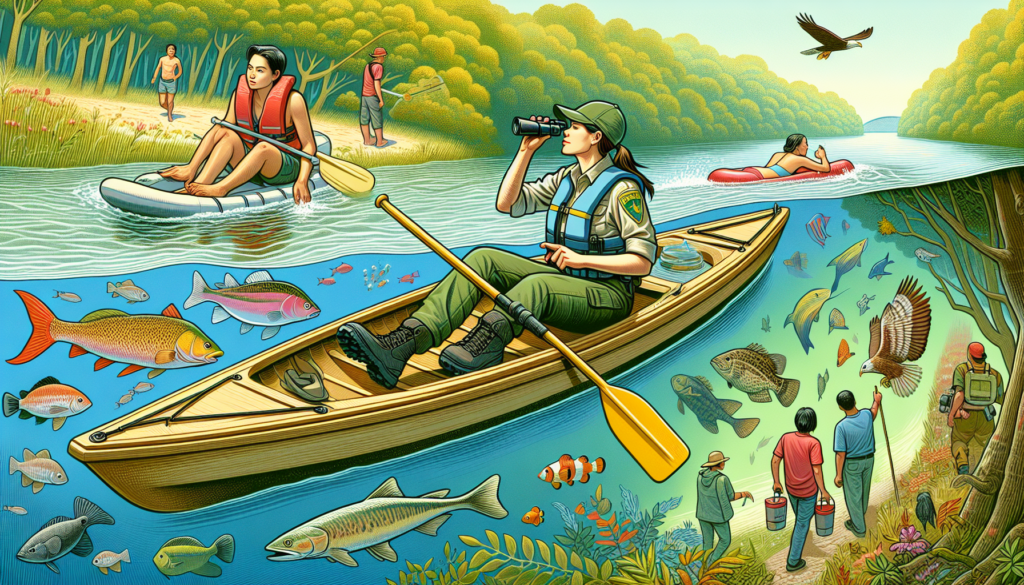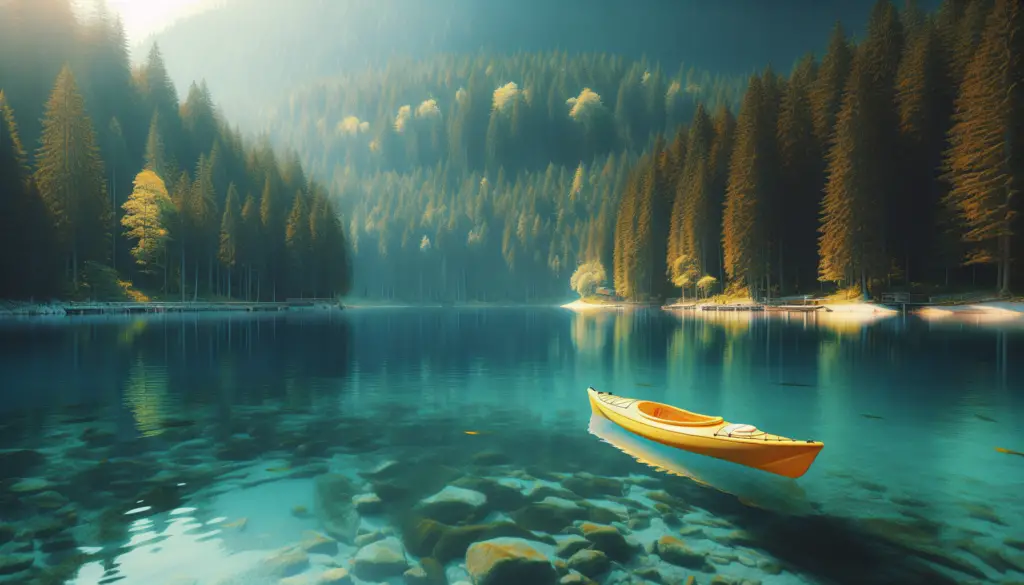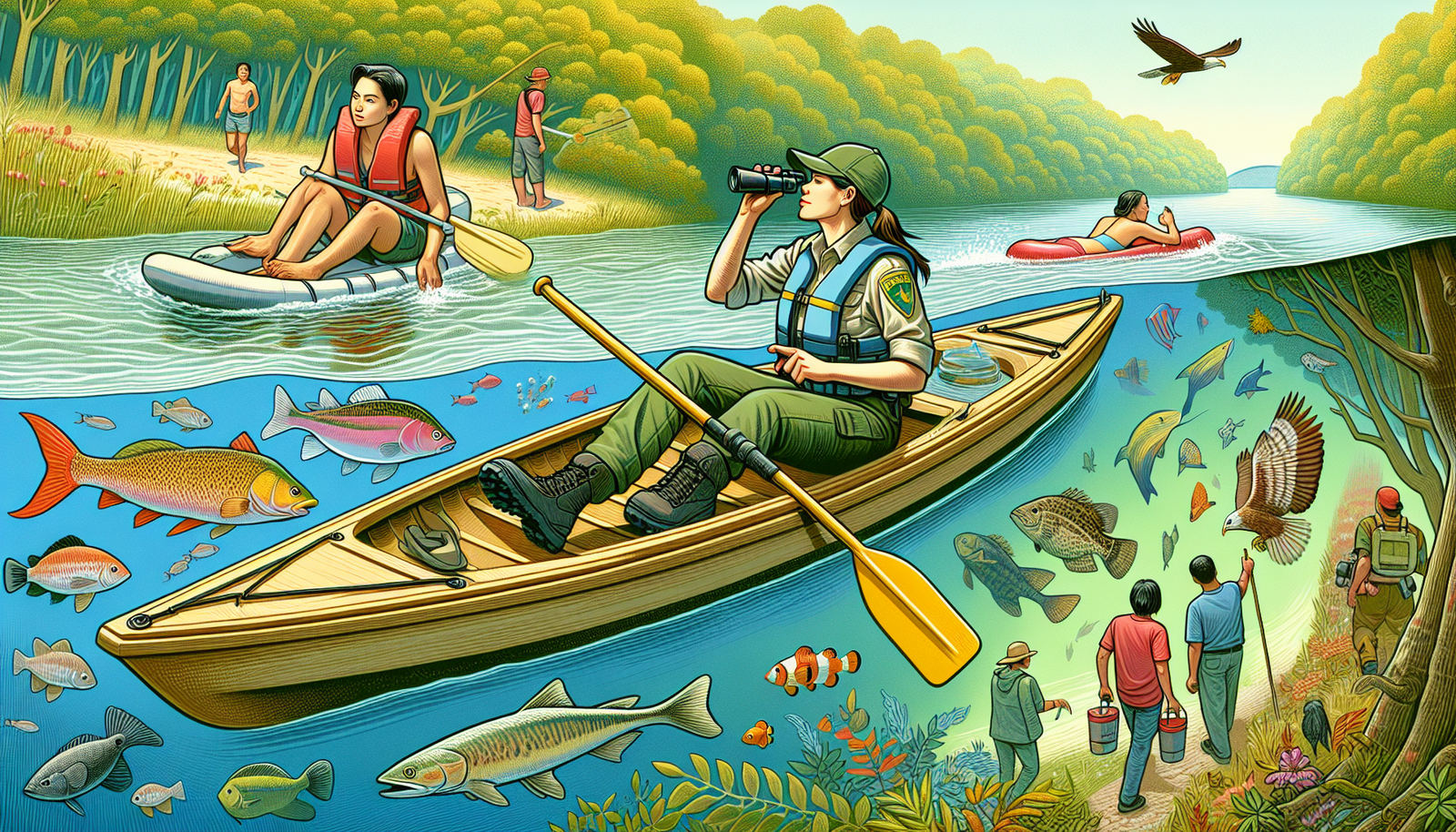So, you enjoy water recreation activities, right? Well, you’re definitely not alone. The thrill of slicing through crisp ocean waves on a surfboard, peacefully exploring lush riverbanks by kayak, or diving deep below the water’s surface to witness the burgeoning life below, beckons to many. Yet, it’s crucial that we keep in mind the delicate balance of the ecosystems we’re so eager to explore and enjoy. In the article, “Maintaining Ecosystem Integrity While Enjoying Water Recreation,” you will discover viable strategies to participate in your favorite maritime pastimes while still preserving the integrity of the ecosystems that make such activities possible in the first place.

Understanding Ecosystem Integrity
When we talk about our environment, one of the key concepts we should be familiar with is ecosystem integrity.
Defining Ecosystem Integrity
Ecosystem integrity refers to the state of an ecosystem where it has a balanced, integrated adaptation of its components. These include both the physical environment and the species that live in that environment. In simpler terms, an ecosystem has integrity when it is healthy and functioning as it should.
The Importance of Ecosystem Integrity
You might be wondering, “Why should we care about ecosystem integrity?” Well, it’s our life support system. It gives us clean air, fresh water, food, shelter, and materials, and even stabilizes our climate. Damage to ecosystem integrity can lead to loss of wildlife, spread of disease, pollution, climate change among other disastrous effects.
How Human Activities can affect Ecosystem Integrity
Sadly, one of the major reasons for loss of ecosystem integrity is human activity. Things like pollution, deforestation, overfishing, and climate change brought about by human activity all have a significant impact on ecosystem integrity. For example, recreational activities, often related to water bodies, can have considerable implications on the health and functionality of these ecosystems.
Impacts of Water Recreation on Ecosystem Integrity
When we think about water recreation, images of pure relaxation and enjoyment come to mind. However, we rarely stop and think about how these activities could impact the ecosystems where they occur.
Physical Disturbances caused by Water Recreation
Water recreation activities such as boating or jet-skiing can cause physical disturbances to aquatic ecosystems. These disturbances can result in habitat destruction for aquatic plants and animals, an increase in erosion, and even alter water flow and temperature.
Chemical Changes due to Water Recreation
It’s not just about the physical changes. Water recreation can also result in chemical changes in the ecosystem. For instance, when we use motorized boats or jet skis, the petroleum products and other substances can leak into the water, causing contamination and endangering aquatic life.
Biological Implications of Water Recreation
And there are also biological implications. For example, activities like fishing can disrupt the food chain and result in an imbalance in the ecosystem.

Different Types of Water Recreation Activities
We engage in various types of water recreation activities, which can have differing impacts on the ecosystem.
Boating and Sailing
Boating and sailing, while relaxing for us, can lead to disturbances to marine and freshwater wildlife. The noise pollution from the engines can disrupt animal behaviours, and the boats can also physically damage habitats.
Fishing and Aquatic Wildlife Watching
Fishing can seriously affect fish populations, particularly if not done sustainably. Aquatic wildlife watching, although seemingly less destructive, can still disturb animal behaviours and deter them from their natural habits if not done responsibly.
Swimming and Diving
Swimming and diving, seemingly harmless water recreation activities, can still pose environmental risks such as the introduction of foreign contaminants through sunscreen and other products or the unintended destruction of aquatic habitats caused by carelessness.
Water Recreation and the Marine Ecosystem
The marine ecosystem is particularly at risk from water recreation activities.
Impacts of Water-Based Activities on Marine Life
Activities like boating can contribute to marine pollution and noise disruption, which can disturb animals and affect their behaviours. Similarly, fishing and wildlife watching, when done irresponsibly, can lead to population decline and behavioural changes in different marine species.
Sustainable Marine Recreation
However, it’s crucial to know there are sustainable ways to enjoy marine recreation. This could involve following best practices when boating, responsible fishing techniques, or wildlife-watching that respects the animals and their habitats.
Protecting Marine Ecosystems while promoting Recreation
Protecting marine ecosystems doesn’t mean stopping all recreation activities. It’s about finding the right balance. For example, designating certain areas where recreation is permitted can protect other fragile regions and reduce overall ecological impact.

Water Recreation and Freshwater Ecosystems
Just like marine ecosystems, freshwater ecosystems like rivers, lakes, and wetlands can also be impacted.
Freshwater Recreation Activities and their effects
Freshwater recreation activities like boating, fishing, or swimming can lead to similar physical, chemical, and biological changes to the freshwater environment, potentially disrupting its integrity.
Promoting Sustainable Freshwater Recreation
Promoting sustainable freshwater recreation involves making users aware of the potential impacts of their activities and encouraging better practices. This can include things like responsible boating avoiding overfishing, or picking up after oneself to prevent littering.
Protecting Freshwater Ecosystems from Recreational Damage
Protecting freshwater ecosystems involves actively managing recreational activities, enforcing regulations, and educating recreational users about the importance of these ecosystems and the potential impacts of their activities.
Sustainable Approaches to Water Recreation
While recreational activities can pose threats to ecosystem integrity, there are sustainable approaches to enjoying our favourite water-related pastimes.
Eco-Tourism and Water Recreation
Eco-Tourism presents a form of water recreation that emphasizes respect for nature and local cultures while offering satisfying recreational experiences. It can provide incentives for local communities to preserve their natural environments and offer a sustainable form of income.
Green Practices in Water Recreation
Green practices in water recreation involve actions designed to minimize the negative impacts of recreational activities on ecosystems. This can include cleanliness and hygiene practices, such as not littering and using eco-friendly products, as well as navigation practices, like staying within designated water channels when boating.
Principles of Sustainable Water Recreation
The principles of sustainable water recreation include an understanding of the environment and protection of ecosystem integrity, minimizing pollution, promoting education and awareness, and supporting local communities.

Regulatory Measures to Protect Ecosystem Integrity
Regulations are crucial for maintaining the balance between recreation and maintaining ecosystem integrity.
Current Legislation on Water Recreation
There are various pieces of legislation currently in place to regulate water recreation activities. These laws often cover recreational fishing, boating, and other forms of water-related recreation, outlining acceptable practices and penalties for noncompliance.
Interpretation and Enforcement of Ecosystem Protection Laws
Interpretation and enforcement of these laws can sometimes be challenging, particularly when it comes to grey areas in the legislation or difficulty in monitoring and enforcement. However, generally, these laws play a substantial role in protecting ecosystem integrity where water recreation activities are concerned.
Regulatory Challenges and Possible Solutions
There are numerous regulatory challenges, from passing new legislation to enforcing existing laws. However, some possible solutions could include better public education about the importance of these laws, more robust enforcement, and greater cooperation between law enforcement and local communities.
Community Participation in Protecting Ecosystem Integrity
While laws and regulations are essential, they cannot work without community participation.
Educating The Public About Ecosystem Integrity
Public education about ecosystem integrity involves teaching people about how ecosystems work, why they’re important, and how our actions impact them. This can often be achieved through school programs, community workshops, aware campaigns, or even through recreational activities themselves.
Community-Led Oversight and Regulation of Water Recreation
Communities have a crucial role to play in oversight and regulation of water recreation. After all, these are their environments that are being impacted. Community-led initiatives can significantly increase compliance with regulations and encourage sustainable practices.
Promoting Sustainable Recreation Practices at the Community Level
Promoting sustainable practices at the community level involves encouraging responsible behaviours during recreational activities, such as trash pickup during fishing, responsible use of motorized boats, or adherence to ethical wildlife-watching practices.
Technology and Innovation in Protecting Ecosystem Integrity
Technology and innovation can offer new ways to protect ecosystem integrity while still enjoying water recreation activities.
Technological Solutions to Minimize Recreational Impacts
Technological solutions can include innovations like quieter engines for boats to minimize noise pollution, electric boats to reduce chemical pollution, or even apps to educate recreational users about potential ecosystem impacts.
Innovative Practices in Sustainable Recreation
Innovative practices in sustainable recreation could involve designing new recreational activities that have minimal impact on ecosystems, developing new methods for monitoring and regulating recreational activities, or even creating incentives for recreational users to behave in more sustainable ways.
Future Developments in Ecosystem Protection Technology
One can only imagine the kinds of future developments in ecosystem protection technology. These could involve more advanced monitoring systems, automation in regulation enforcement, or even new eco-friendly recreational equipment.
Advocacy for Better Practices in Water Recreation
Advocacy plays a crucial role in promoting better practices in water recreation.
Role of NGOs in Promoting Ecosystem Integrity
Non-Governmental Organizations can play a huge role in advocating for ecosystem integrity. They can raise awareness about the impacts of recreational activities, lobby for stronger legislation, and even help educate recreational users about sustainable practices.
Water Recreation Industry’s Contribution to Sustainability
The water recreation industry itself has a crucial role to play. By adopting sustainable practices and advocating for them, the industry can effectively contribute to maintaining ecosystem integrity while offering enjoyable experiences to users.
Increasing Awareness and Advocacy for Ecosystem-friendly Recreation
Finally, it all comes down to increasing awareness and advocacy for ecosystem-friendly recreation. This can involve anything from spreading awareness about sustainable practices, lobbying for stronger regulations, or even just setting a good example during our own water recreation activities.
In conclusion, maintaining ecosystem integrity while enjoying water recreation is possible. It’s all about understanding the impacts of these activities, adopting sustainable practices, advocating for protection, using technology, and engaging communities and industries in the effort. That way, we can all play a part in preserving our beautiful aquatic ecosystems for generations to come.

